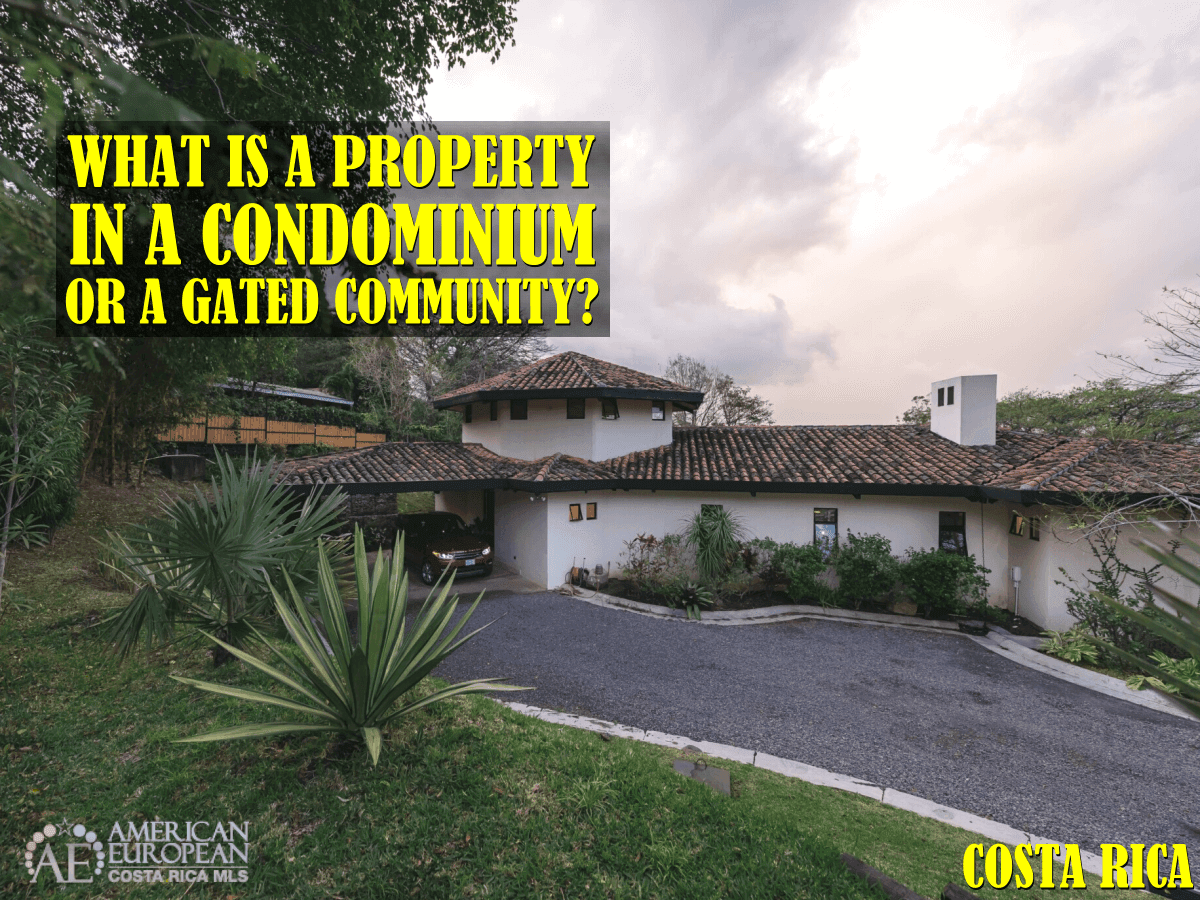Estimated Reading Time: 7 Minutes
In Costa Rica, a considerable part of the population lives on property in a condominium. What exactly is a condominium? Is it any different than a gated community? Learn more now to wisely invest in property in a condominium or gated community here.
For people who work all day or are retired and travel a lot, it’s nice not to have to worry about the security of their home. Besides, it’s often cheaper to be able to use common areas and amenities like a pool or a tennis court than to have your own.
Most buyers are unfamiliar with the terms “property in a condominium,” “gated community,” or “community with controlled access.” Let’s explore those first and then discuss the pros and cons of living in a condominium.
If you know the condominium property’s title number, you will see that the number has an F for finca filial. The title number in a condominium looks as follows 1-123456-F-000
When constituting the condominium, the developer’s attorney must formally describe each unit, the administration/management and bylaws, the common areas, and other details and present the constitution to the National Registry. Also, HOA fees are regulated and mandatory.

Property in a condominium
A condominium is a legal term and is regulated in Article 1 of the regulating law of property in condominium N° 7933 as follows:
- To the various floors, premises, offices, parking lots, or apartments into which one or more buildings are divided, whether built or constructed on the same property or different properties, and whether they belong to one or more owners or concessionaires. When the assignment of several properties is registered, they shall be joined together to form a single-parent property.
- The different buildings to be constructed on a single property if they are to belong to different owners.
- To the real estate suitable for construction, both for the lots or rural property into which the land is divided and for the buildings to be erected thereon.
- When the owner of a building or a housing, commercial, tourist, industrial, or agricultural development already constructed decides to submit it to the condominium property regime if there are independent and indivisible common elements and all the technical requirements demanded by this law are met.
- When the holder of a concession right over a real estate property intended to be exploited for tourism or commercial purposes decides to submit his project to the provisions of this law. In this case, it must have the express and previous authorization of the authorities that have granted the concession.
- Projects to be developed in stages, whose urbanization or civil works are submitted to the condominium property regime and where the resulting subsidiaries are, in turn, converted into parent properties of a new condominium, without these, for such reason, losing their status as subsidiaries of the original condominium; the foregoing, under the provisions of the project and the duly approved original plans, as well as in the condominium regulations.

A Gated Community
A gated community is not a legal term in Costa Rica. The term is widely used for a condominium but also for a “Fraccionamiento Agricola.” This is not a condominium. You can read more in HOA in some Costa Rican gated communities is not legal because that’s not a condominium. That type is merely a community with a gate but is not necessarily a registered condominium with no bylaws. HOA fees are not regulated or mandatory, but having a sense of belonging and easier coexistence is necessary.
Community with controlled access
A community with controlled access is usually used here in a subdivision with only one access road. For security reasons, there is a traffic barrier with a guard at the community entrance to control access. Like in a not-regulated gated community, an HOA fee is not mandatory, and bylaws are not legal but often used to make coexistence easier between neighbors.

Different types of condominiums
A house or apartment
The property can be an apartment building or townhouse, has a simple fee title, and is registered as a Finca Filial, as described at the beginning of this blog. When you see 15-50 cookie-cutter townhomes in a community, for sure it’s a condominium. But when you see single-family homes, and they’re all different, you must do your homework. The Condominium must have legally registered bylaws. The unit will have a simple fee title, which banks or private lenders can mortgage.
A building lot
The property is a building lot in a condominium. It has a simple fee title, just like a townhouse or apartment, and the lot can be mortgaged. The community will have duly registered Bylaws and functions like any other condominium. Some might charge a lower condo fee for an empty building lot.
Be careful when the Condominium is mixed and has both townhouses and building lots in the same community. A single-family lot is generally much larger than the land a townhouse sits on. And a condo fee is charged for the private area.
Contact us now to speak to a well-trained agent and purchase a house, apartment, or building lot in a condominium in Costa Rica.


















